![🦑 Gitset.dev [Astro.js - Python - React.js - AI - Node.js]](/images/assets/gitset-preview-rounded.png)
🦑 Gitset.dev [Astro.js - Python - React.js - AI - Node.js]
- Ivan Luna
- Python , Backend Development , Fullstack Development , AI Integration , APIs & Integrations , Auth & Security , Databases & ORMs , Automation & CLI Tools , SaaS Development , Astro.js , React.js
- 06 Jun, 2025
Gitset.dev is a comprehensive suite of AI-driven tools that enhances your GitHub development experience. It provides solutions for streamlined repository management, precise versioning, and clear documentation. Built with Astro.js/React.js, and integrating 8 Python-based backends (FastAPI and Flask), it combines AI-powered suggestions with user-requested improvements, continuously refining results to deliver optimized outcomes. It offers both public utilities and authenticated services to streamline repository management, documentation, version control tasks and more.
Core Features:
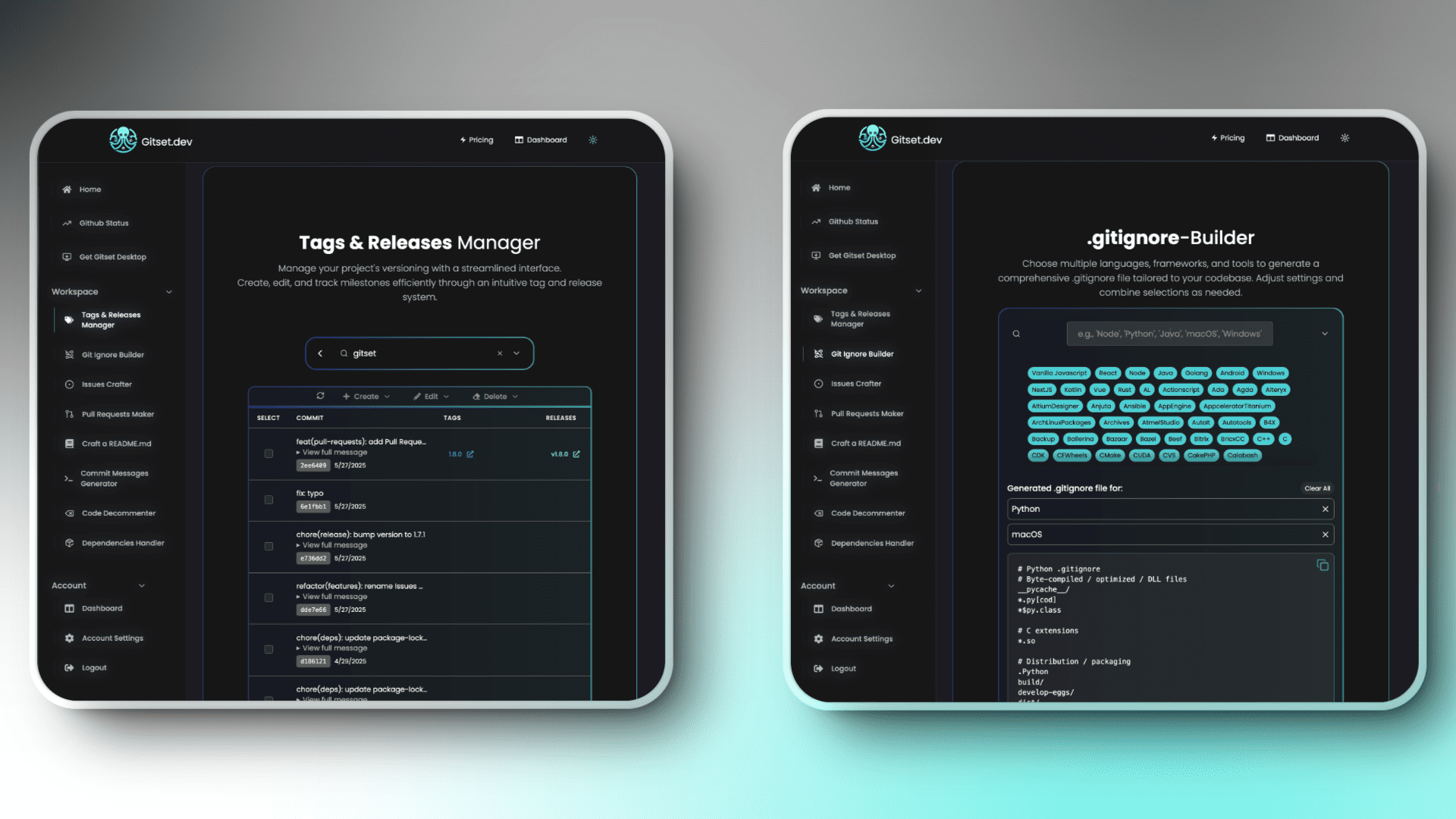
-
Tags & Releases Manager: Simplifies release management by providing tools to create, edit, and manage GitHub tags and releases through a streamlined interface. It integrates AI-powered suggestions for release notes that accurately reflect code changes, allowing fine-tuning to meet specific requirements. The tool ensures a more efficient and consistent release process, reducing manual effort and providing developers with a reliable solution for managing versioning and releases within the development cycle.
-
.gitignore Builder: Automatically generates customized .gitignore files tailored to specific languages and frameworks. Users can easily select the desired tech stack, and the tool combines relevant rules to create an optimized .gitignore file. This eliminates the need for manual template searches, ensuring clean and efficient repository management with minimal effort. Ideal for developers working across multiple technologies, this tool simplifies the process of maintaining tidy codebases.
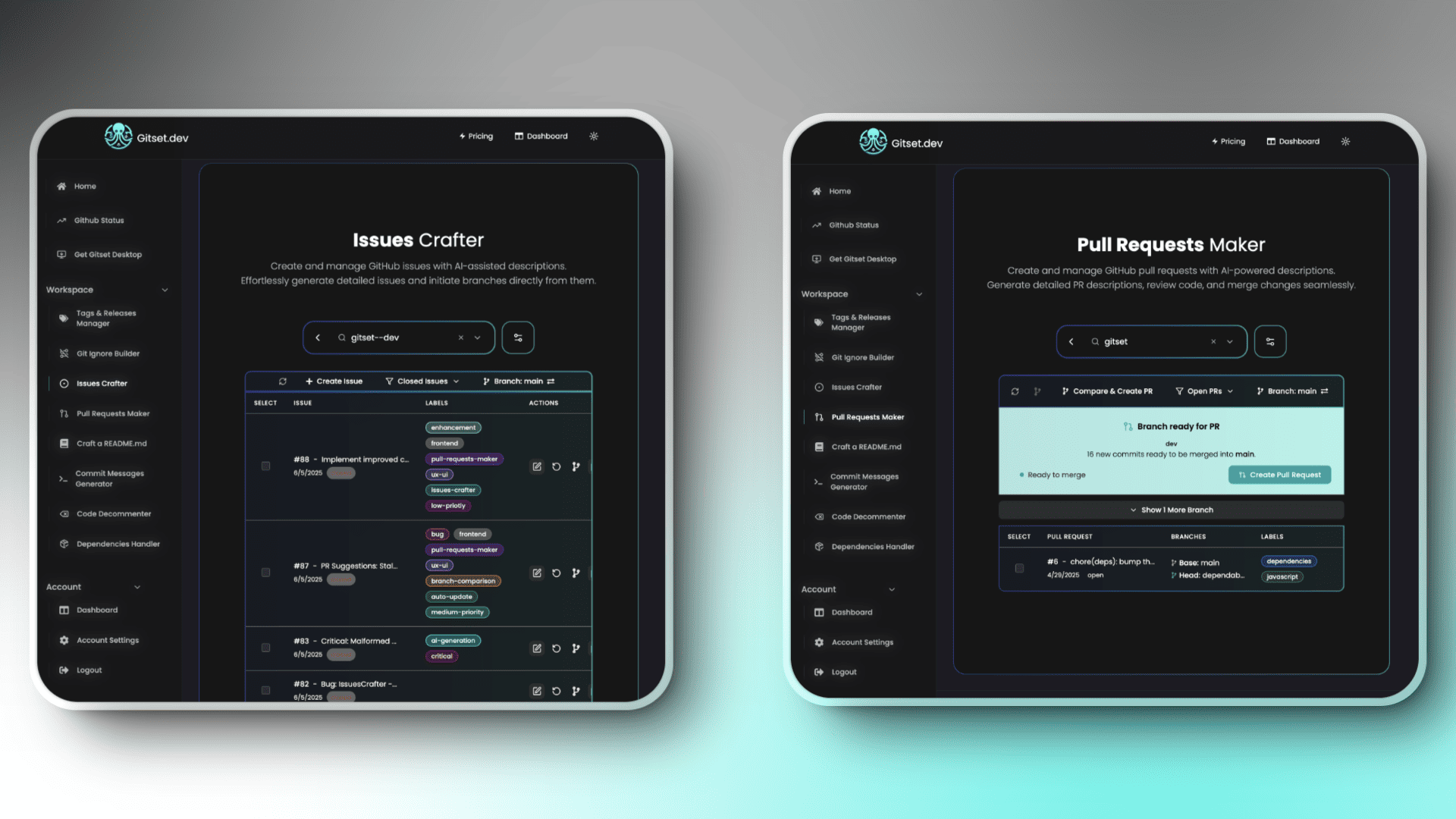
-
Issues Crafter: Streamlines the process of managing GitHub issues by leveraging AI to generate structured, context-aware issue descriptions and automate routine tasks. It enhances issue tracking through intelligent classification, prioritization, and progress monitoring. Designed for developers and project teams, it enables efficient collaboration, reduces manual overhead, and ensures consistency across project workflows, making it an essential tool for maintaining productivity in agile development environments.
-
Pull Requests Maker: Manages the complete pull request lifecycle from branch comparison to merge completion. This comprehensive tool enables branch comparison, generates AI-powered PR descriptions based on commit messages and file changes, and facilitates collaborative code review processes. It supports draft PR creation, assignee and reviewer management, bulk labeling operations, and detailed analytics showing commits, file changes, and review history. The tool streamlines merge operations with conflict resolution support, ensuring efficient code integration while maintaining high-quality standards and consistent documentation practices across development teams.
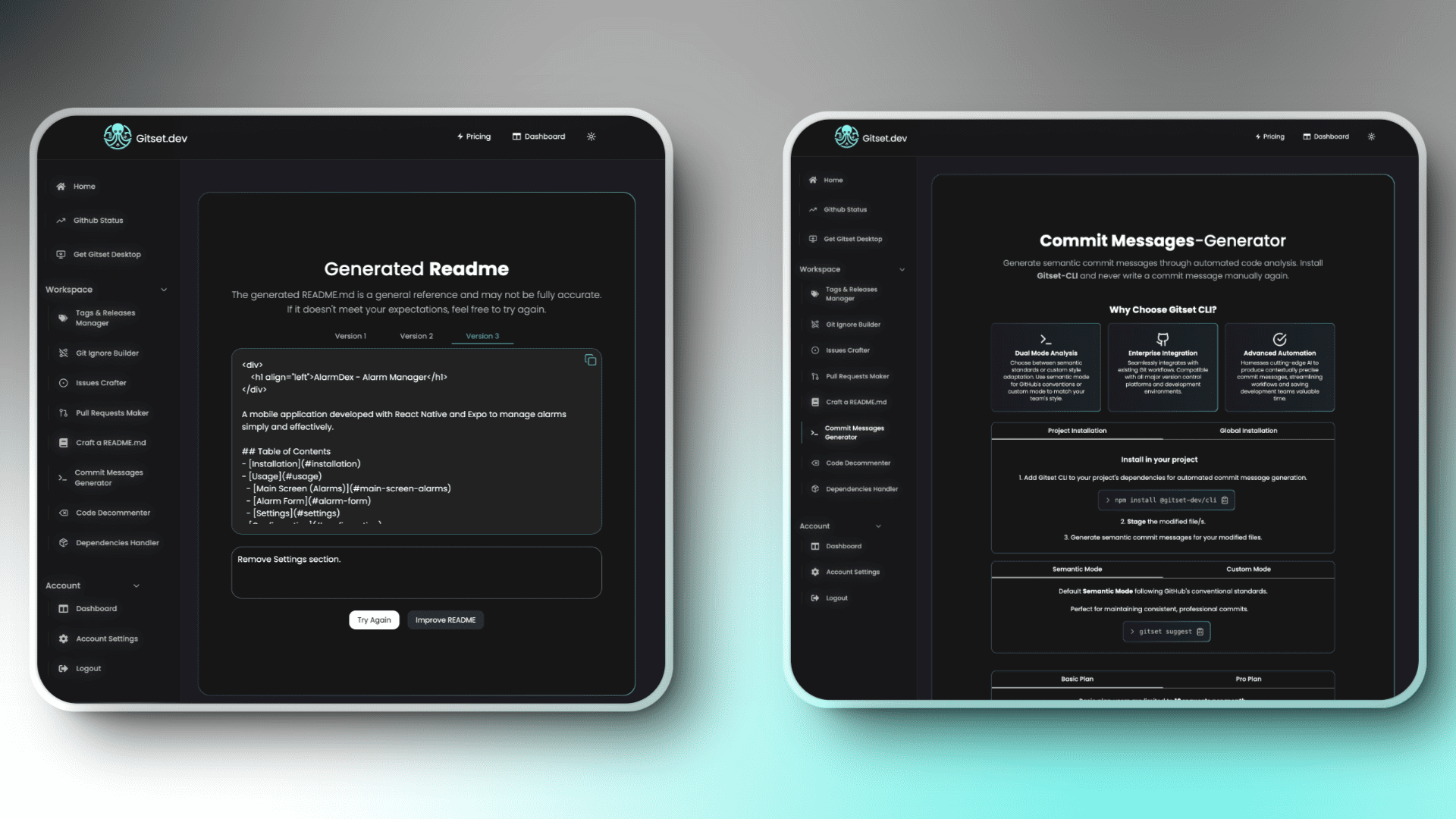
-
Public AI-Readme Generator: Automatically generates professional README.md files for any public GitHub repository. By analyzing repository content, it creates comprehensive documentation, including features, installation guides, usage instructions, and contribution guidelines. Users can request modifications to the initial generated README, receiving different versions based on specific requirements. Additionally, the tool allows users to compare versions, ensuring that the final README perfectly aligns with the project’s needs and presentation standards.
-
Personal AI-Readme Generator: Similar to the Public AI-Readme Generator, but for both public and private repositories that authenticated users own. It generates detailed README.md files, covering all essential sections of project documentation. Users can refine the initial output by requesting adjustments, receiving multiple iterations based on their preferences. The tool also supports comparing different versions of the README, making it easy to select the most appropriate one for the project. This flexibility ensures that both private and public repositories have high-quality, customizable documentation.
-
Commit Messages Generator: Enhances Git operations through a command-line interface (CLI) that utilizes AI to automatically generate contextually accurate commit messages. Powered by Google’s Gemini Pro AI technology, the tool analyzes staged changes and provides commit suggestions based on semantic versioning or custom user-defined styles. It adapts to existing commit patterns to ensure consistent formatting in team environments. Optimized for efficiency, the tool delivers rapid message generation while minimizing resource usage, and supports cross-platform integration for consistent performance across various systems.
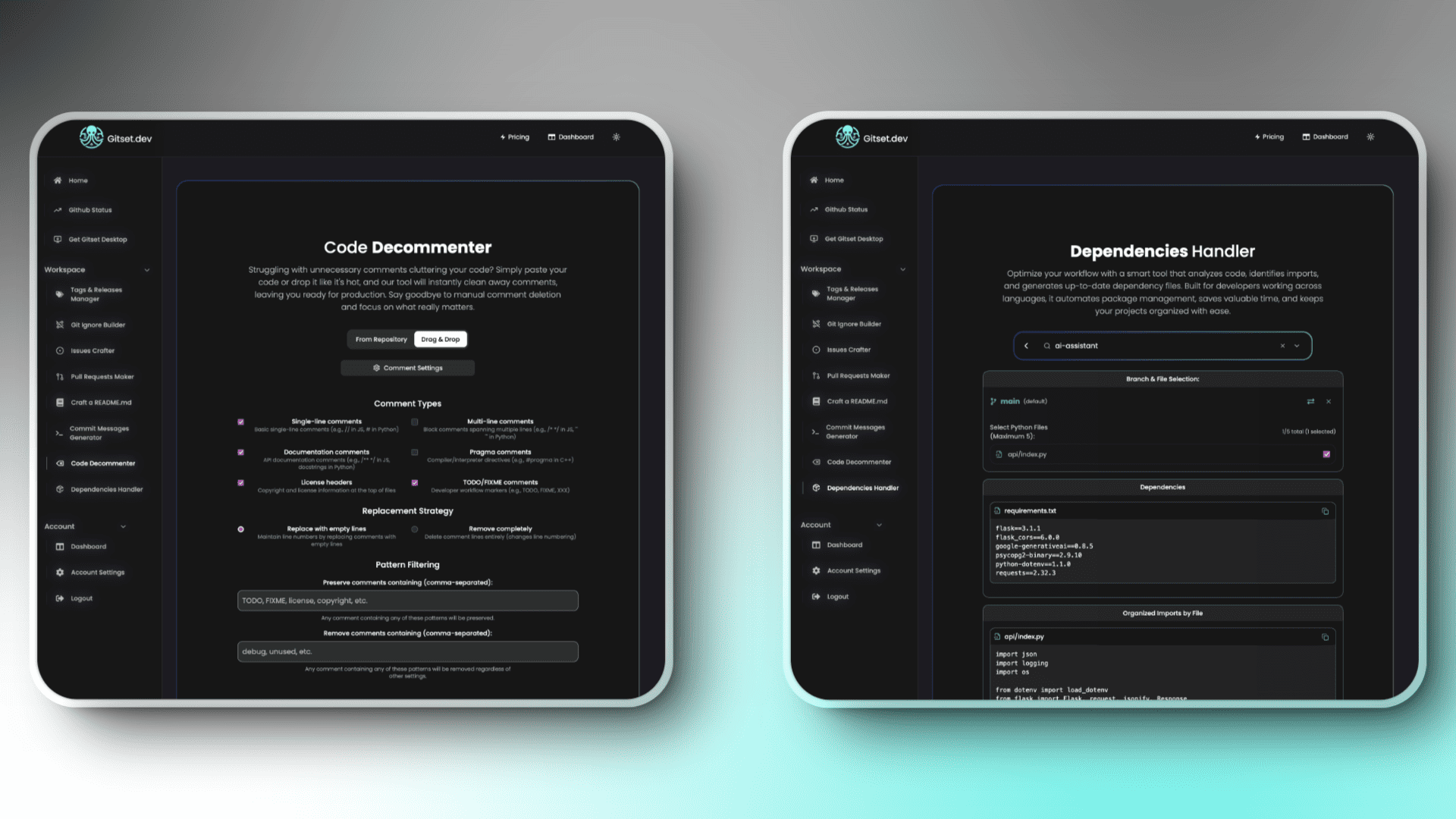
-
Code Decommenter: Processes source code to remove unnecessary comments, improving readability and optimizing the code for production. It supports multiple programming languages and allows selective removal of inline, block, documentation, and pragma comments based on user-defined parameters. The tool efficiently parses code, ensuring that functionality remains intact while reducing clutter. Ideal for maintaining clean codebases and streamlining automated processing in development workflows.
-
Dependencies Handler Streamlines dependency management across multiple programming languages. It analyzes codebases to identify external dependencies, organizes imports following best practices, and generates configuration files for dependency management. Supported languages include Python, Java, C/C++, and Rust. The tool produces files such as
requirements.txt,pom.xml,Cargo.toml, andCMakeLists.txt, ensuring efficient and standardized project setups. Ideal for multi-language repositories and maintaining clean, well-structured code.
Gitset CLI (@gitset-dev/cli)
The Gitset CLI is a robust command-line tool enabling AI-driven commit message generation directly from the terminal.
Semantic Mode (Default):
Generates semantic, convention-based commit messages automatically.
$ gitset suggest
✨ feat: Add user authentication feature with JWT supportCustom Style Mode:
Enables the generation of commit messages in a custom format, tailored to the preferences of the user or their team.
$ gitset suggest --mode custom
✨ [Auth] Added JWT user authentication 🔐Optional: Configure analysis depth:
Offers the option to configure the number of previous commits to analyze for more tailored suggestions.
$ gitset suggest --mode custom --commit-count 30
✨ [Auth] Added JWT user authentication 🔐The CLI intelligently adapts to your personal commit style by analyzing your previous commits, matching your formatting preferences, emoji usage, and message structure.
With its adaptive capabilities, the Gitset CLI enhances commit consistency and productivity, ensuring high-quality version control practices across projects.
Technical Architecture:
Based on a modular, service-oriented architecture, it employs distinct service layers to manage client requests, authentication, AI-driven processing, content aggregation, and improvement handling. The design follows best practices for scalability, performance, and security, ensuring a clear separation of concerns between public and protected services.
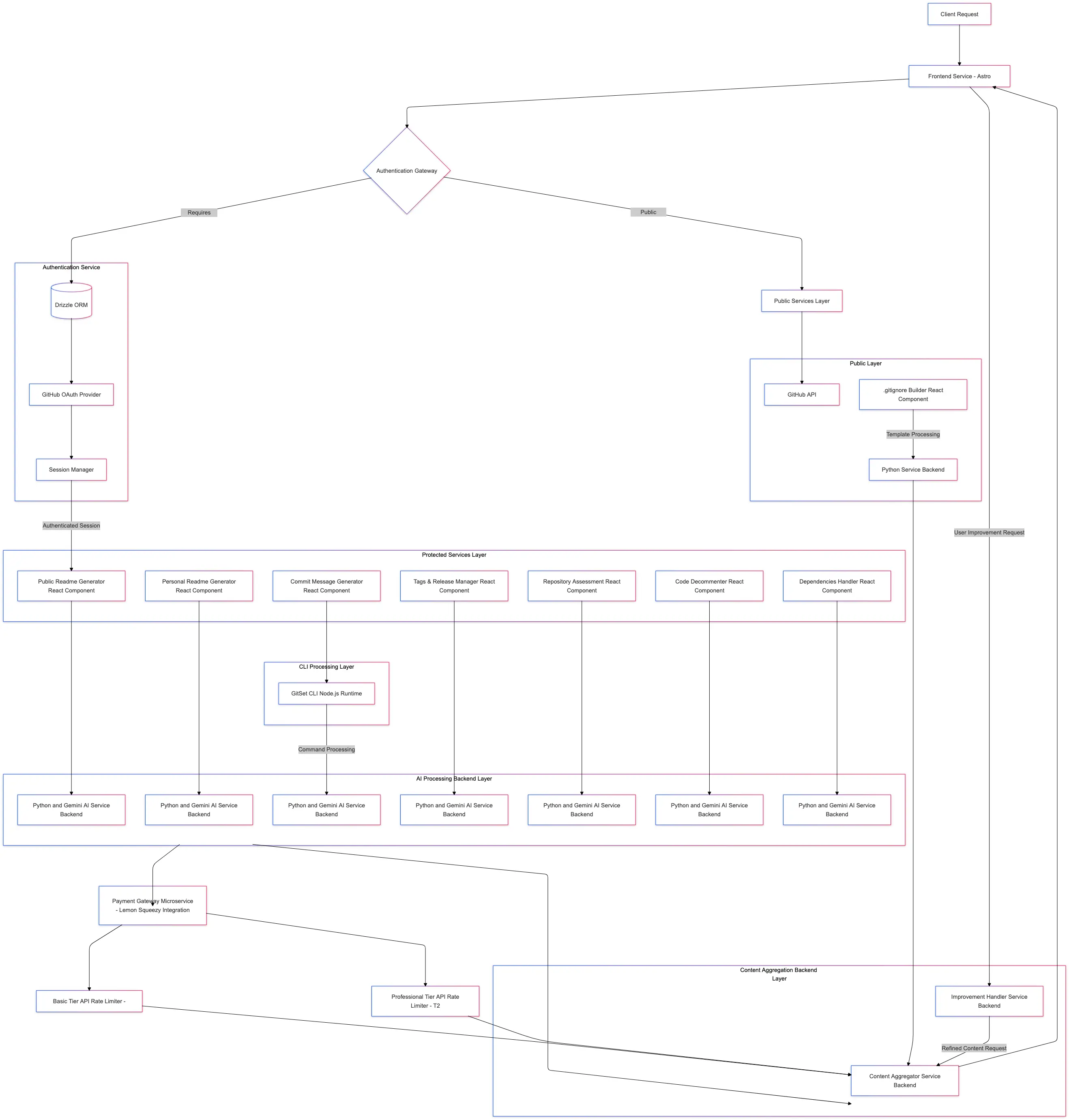
View this graph in an interactive editor here.
Frontend Layer
- Entry Point: Built with Astro SSR and React.js, it manages user interactions, content rendering, and communication with other services.
Authentication System
-
Authentication Gateway:
- Functions as the security checkpoint, routing requests based on the authentication status of users.
- Enforces access control policies and ensures secure request handling by interfacing with the authentication service.
-
Authentication Service:
- Utilizes Drizzle ORM for database interaction, providing persistent storage for user data.
- Integrates GitHub OAuth for user authentication, managing session tokens and ensuring secure user identification.
- The session manager is responsible for managing the lifecycle of user sessions.
CLI Processing Layer
- Gitset CLI: Is an integral component of the Gitset.dev ecosystem, designed to enhance Git workflow automation through AI-driven commit message generation. By leveraging Google’s Gemini Pro AI technology, it provides intelligent analysis of staged changes to generate contextually appropriate commit messages, supporting both semantic and personalized formatting styles.
Protected Services Layer
- Core Services: Includes README generation, commit message creation, version control, issues management, pull request management, and code decommenting.
AI Processing Backend Layer
- Parallelized AI Services: Multiple Gemini AI instances handle specific tasks efficiently, ensuring scalability.
Public Services Layer
- Public Tools: Includes GitHub API integration and
.gitignorebuilder.
Content Management Layer
- Content Aggregator: Normalizes and delivers content from various sources.
- Improvement Handler: Processes user feedback for content refinement.
Payment Processing & Rate Limiting:
Lemon Squeezy Integration & Request Tracking
The payment system implements a tier-based access control mechanism that operates across multiple layers:
-
Payment Processing (Lemon Squeezy Layer):
- Handles subscription management and payment processing
- Communicates plan changes via webhooks
- Maintains billing and subscription data separately from usage tracking
-
Usage Tracking (Python Backends):
- Each Python backend maintains its own protected request counter.
- Request tracking is isolated from payment data and OAuth authentication.
- Counters are stored securely and independently of Drizzle ORM user data.
- Rate limits are enforced per service:
- Basic Plan (T1): Feature-specific limits.
- Professional Plan (T2): Unlimited access.
-
Request Flow:
- Backend validates request tier (
basic/pro) via authentication token. - Service-specific counter checks remaining quota.
- Request processed if quota allows.
- Counter updated atomically after successful processing.
- Backend validates request tier (
-
Security Considerations:
- Usage tracking is isolated from payment processing.
- Authentication data (GitHub OAuth/Drizzle ORM) remains separate.
- Each service maintains independent rate limiting.
Technical Considerations
-
Scalability: The system ensures horizontal scalability with independent scaling of AI processing units, as well as the distributed handling of public and protected service layers. Each layer can scale independently based on demand.
-
Security: The authentication gateway serves as the primary security checkpoint, ensuring that only authenticated requests can access protected services. OAuth-based authentication ensures secure user identification and session management.
-
Performance: The use of parallel AI processing, combined with a robust content aggregation system, ensures that the system can efficiently process and deliver content. The public and protected services are optimized for minimal latency.
-
Integration Points:
- Integration with GitHub for authentication and API access.
- Gemini AI services for advanced content generation and analysis.
- Python backend (FastAPI and Flask): Handles template-based processing and AI-driven request handling and response delivery.
- SSR frontend ensures dynamic rendering of content based on user interaction.
Installation & Setup:
Frontend:
git clone https://github.com/imprvhub/gitset.git
cd gitset
npm install
npm run devCLI:
npm install -g @gitset-dev/cli
gitset suggest # Generate commit messagesConclusion:
Gitset.dev represents a significant achievement in creating a comprehensive GitHub toolset that combines AI capabilities with practical development workflows. The project demonstrates proficiency in:
- Building scalable, service-oriented architectures
- Implementing OAuth authentication with GitHub
- Developing CLI tools that adapt to user preferences
- Integrating AI services for code analysis and content generation
- Creating user-friendly interfaces for complex Git operations
The addition of the Gitset CLI, with its ability to learn and adapt to personal commit styles, showcases the project’s commitment to providing tools that enhance developer productivity while maintaining individual workflow preferences.
![🎬 EnterCinema [Vue.js - Rust - LibSQL]](/images/assets/entercinema-asset1.webp)
![🔌 MCP Series [Node.js - Claude Desktop - AI Agents]](/images/assets/mcp-series-preview.png)
![🛠️ AWS SAM-CLI [Lambda, S3, DynamoDB]](/images/assets/aws-samcli-dynamodb-template.png)
![🌐 MCP Browser Agent [Node.js - Playwright - Claude Desktop]](/images/assets/mcp-browser-agent-preview.png)
![🗞️ MCP Claude HackerNews [Node.js - HackerNews API - Claude Desktop]](/images/assets/mcp-claude-hackernews-preview.png)
![🎵 MCP Claude Spotify [Node.js - Spotify API - Claude Desktop]](/images/assets/mcp-claude-spotify-preview.png)
![📡 MCP RSS Aggregator [Node.js - RSS/OPML - Claude Desktop]](/images/assets/mcp-rss-aggregator-preview.png)
![🏷️ MCP Domain Availability Checker [Python - Domain APIs - Claude Desktop]](/images/assets/mcp-domain-availability-preview.png)
![📈 MCP Status Observer [Node.js - Status APIs - Claude Desktop]](/images/assets/mcp-status-observer-preview.png)
![📈 Peekvisor [Astro.js - TypeScript - Analytics - Privacy - SAAS]](/images/assets/peekvisor-preview-rounded.png)
![Bolted - [Astro.js - Python - React.js]](/images/assets/bolt-url.png)